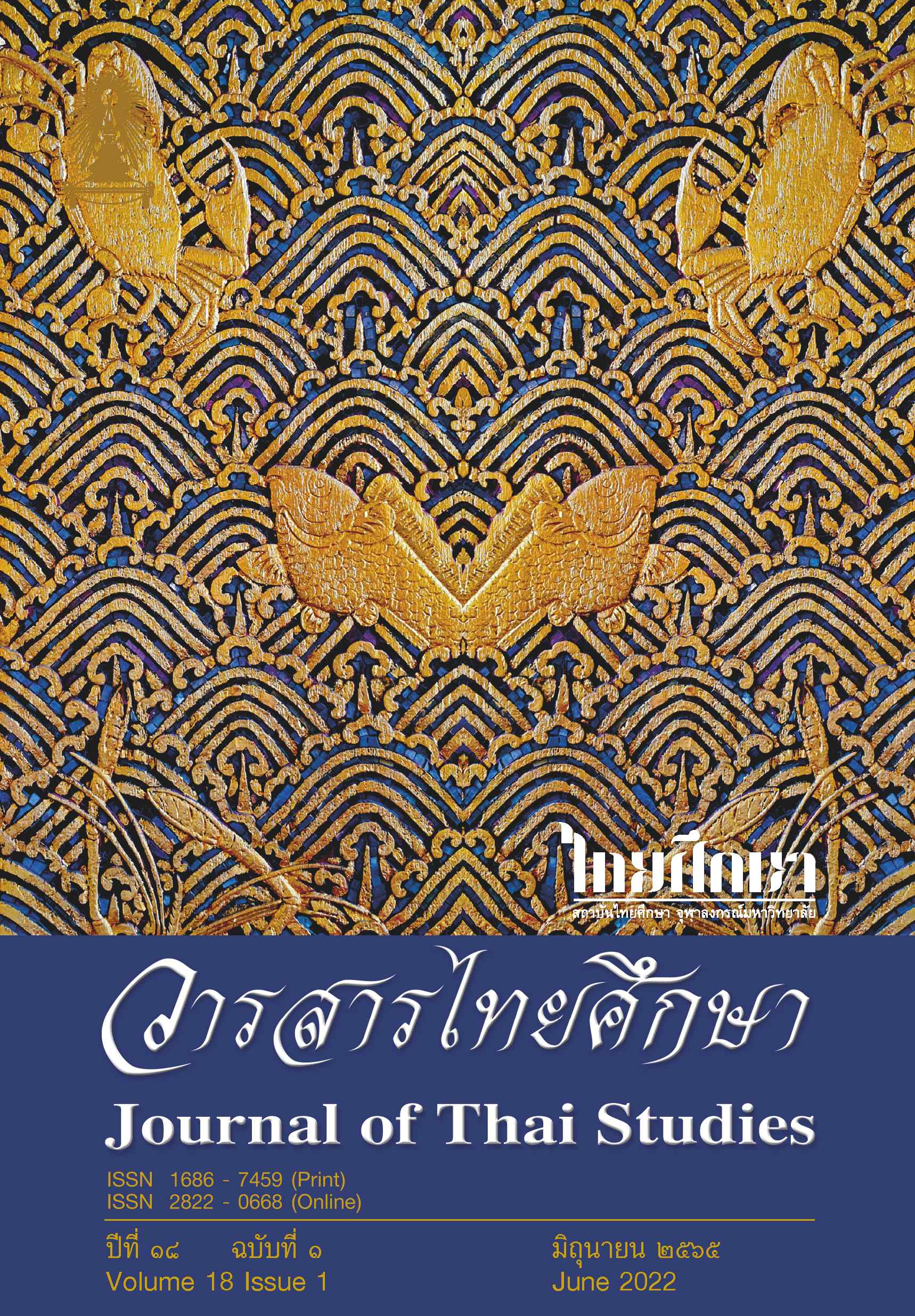Thai Literature in semi-academic pocketbooks (2015-2019 A.D.): The production and dissemination of knowledge outside the Fundamental Thai Textbook ‘Wannakhadivichak’ (2008 A.D.)
Main Article Content
Abstract
This study aims at analyzing the production and dissemination of Thai literature in semi-academic pocketbooks (2015-2019 A.D.), as compared to the Fundamental Thai Textbook ‘Wannakhadivichak’ (2008 A.D.) by applying the concept of Pierre Bourdier regarding the sociology of literature and the “field”. The study found that the process of production and dissemination of Thai literature textbooks has sustained the cultural structure of national education. It can be seen that the content in textbooks reveals the criteria used for the type selection based on Thai literature heritage produced by the Royal Society of Literature and that produced by elite scholars of Siam. In this production process, didactic literature has been selected to be the important data to explain the value of literature as an esthetic production of elite writers and a reflection of traditional Thai society and culture. Such a process is different from the production of non-textbooks, where it was found that such textbooks are produced by those outside the Thai literature field. The content of such textbooks aims to explain bits of knowledge outside textbooks and question the concept of values in mainstream Thai literaturetextbooks. The production of non-textbook outside the national education system results in limited audiences, short-term life and inconsistent dissemination. KnowledgeofThai literature is a cultural capital for academicians inside and outside the field of literature. For insiders, knowledge of literature contributes to an academic network in the national education system; whereas for outsiders, Thai literature is to make income and provide visibility in publication and modern knowledge platforms. In conclusion, this study reveals that the characteristics of knowledge bargaining in the field of Thai literature still clings to the national education system because of the transformation of the function of Thai literature by the national education sector.
Downloads
Article Details

This work is licensed under a Creative Commons Attribution-NonCommercial-NoDerivatives 4.0 International License.
Journal of Thai studies is licensed under a Creative Commons Attribution-Noncommercial-NoDerivatives4.0 Intenational (CC BY-NC-ND 4.0) licence, unless otherwise stated. Plese read our Policies page for more information on Open Access, copyright and permissions.
References
Baesio, K. (2021). “The approach of the application of storytelling in teaching Thai literature for secondary education”. Journal of MCU Buddhapanya Review, 6(1), 198-210.
Bourdieu, P. (1993). The Field of Cultural Production. New York: Columbia University Press.
Daengsakun, K. (2019). Storylog: phro thuk khon mi rueang lao phan prasopkan chiwit lae tongkan song to arom khwamrusuek [Storylog: because everyone has their own stories from experiences and passed down emotions] in utsahakam prasan sin : wannakam watthanatham sakrin lae kan doenthang kham sue [The arts integration industry: literature, screen culture and the journey across media], Prasannam, N.(ed.). Bangkok: Contemporary Art Promotion Fund, Office of Contemporary Culture, Ministry of Culture.
Debyasuvarn, B. M.L.(1986). waen wan kan [Glasses for literature suspicion]. Bangkok. Anthai.
Department of Mental Health, Ministry of Public Health. (2003). Teacher Handbook for mental health support for Junior High School Students. [manuscript online]. Retrieved from https://www.dmh.go.th/download/ebooks/MEH7.pdf
Inthonphon, W. (2009). Rai ngan kan wichai ‘Sap li huan : kansueksa nai ngae sangkhomwitthaya wannakhadi’ [Research report, ‘Sappha Li Huan: a study of the sociology of literature’]. Songkla: Faculty of Liberal Arts (Educational Foundation) Prince Of Songkla University.
Khamthai, K. (2017). sunthon phu maidai paopi phra aphai mani maichai khon rayong [Sunthorn Phu did not play the flute; Phra Aphaimani was not from Rayong]. 3rd edition. Bangkok: Day Poets.
Khamthai, K. [alias] (2018). kham khru [Teacher words].The Cloud webpage. Retrieved August23,2020, from https://readthecloud.co/talk-tutor-tom
Kreuthong, P. (2015). wannakhadi khisongsai [Suspicious Literature]. Bangkok: Read Publishing House.
Ministry of Education. (2018). wisaithat khong laksut kaen klang kansueksa khanphuenthan phutthasakkarat 2551. (Vision of the Basic Education Core Curriculum B.E. 2551). Retrieved from http://www.cvk.ac.th/download/pdf
Ministry of Education. (2010). nangsue rian rai wicha phuenthan phasa thai wannakhadi wi chak chan matthayomsueksa pi thi1 [Thai literature textbook for Secondary 1]. Bangkok: Teachers Council.
Ministry of Education. (2010). nangsue rian rai wicha phuenthan phasa thai wannakhadi wi chak chan matthayomsueksa pi thi 2 [Thai literature textbook for Secondary 2]. Bangkok: Teachers Council.
Ministry of Education. (2010). nangsue rian rai wicha phuenthan phasa thai wannakhadi wi chak chan matthayomsueksa pi thi 3 [Thai literature textbook for Secondary 3]. Bangkok: Teachers Council.
Nagavajara, C. (1971). wannakhadi wichan lae wannakhadi sueksa [Literature Criticism and Literature Studies] in wanwaithayakon. Bangkok: Thaiwattanapanich.
Netrananda, A. (2018). A study of Lilit Taleng Phai in literature appreciation volume 5 for the preparation of Thai literature teaching in the upper secondary level. In Proceedings of 56th Kasestsat University Annual Conference: Education, Economics and Business Administration, Humanities and Social Sciences (pp. 723-731). Bangkok (Thailand): The Thailand Research Fund.
Prakitnonthakan, C. Architect, Knowledge and Architecture Schools. NAJUA: History of Architecture and Thai Architecture, Vol. 13 (2016), 1-38.
Prasannam, N. Poem book for Thai teenagers, a study of the sociology of literature. Journal of the Faculty of Arts, Silapakon University, 27, 1 (June-April 2006), 165-202.
Raksamani, K. (2013). kan wicai wannakhadi [Literature Research]. Bangkok: Department of Oriental Languages Faculty of Archeology Silapakon University.
Raksamani, K. (2004). pakonnam nithan [The Sanskrit vetala cycle in Thai tales]. Bangkok: Maekhamphang.
Raksamani, K. (2004). wannakhadi midi yangrai [What is the benefit of literature?] in wannasanvijai. Bangkok: Maekhamphang.
Read to tell, Tell to read. (n.d.). Thaibookreviews [Facebook Page]. Facebook. Retrieved August23,2020, from https://www.facebook.com/Thaibookreviews/posts/1455581391153878/
Sajjaphan, R. (2014). 100 years of Wannakhadi Samoson. The Journal of the Royal Society of Thailand, 39(3) (July-September 2557), 317-337.
Sajjaphan, R. (2019). New Opportunities for Contemporary Novels in Thailand 4.0. Songklanakarin Journal of Social Sciences and Humanities,25(2), 1-45.
Siwasariyanon, W. (1961). wannakhadi lae wannakhadi wichan [Literature and Literature Criticism]. 3rd edition. Phranakhon. P.E.N. International Thailand-Centre Under the Royal Patronage of H.M. The King.
Techawongstien, K. (2016). The sociology of the representation of national self through the translation of modern Thai literature into English: a Bourdieusian approach. (Doctoral Dissertation) SOAS, University of London, UK.
Tetchaksema, C. (2019). wannakhadi thai dai cet [Thai Literature Digest]. 5th edition. Bangkok: Day Poets.


